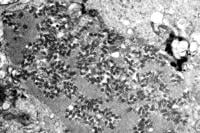An Ontario health official says a child has died of rabies after being exposed to a bat in the northern part of the province.
Dr. Malcolm Lock, acting medical officer of health for the Haldimand-Norfolk Health Unit, which covers an area south of Hamilton, confirmed the death during a board of health meeting.
Lock described the "unfortunate" details during the meeting on Wednesday, saying the case was contracted in northern Ontario.
"Basically, they woke up with a bat in the room. The parents looked at the child, didn't see any signs of a bite or scratches or saliva, and didn't seek getting the rabies vaccine," he said.
"So, unfortunately, that child is now deceased."
Though it remains exceedingly rare for humans, Lock said rabies is increasing in the bat population, with a 16 per cent positivity rate this year compared to less than 10 per cent in previous years.
Lock's comments about rabies referred to "recent cases in Brant County" that were outside the jurisdiction of the Haldimand-Norfolk unit, a spokesperson for Norfolk County said Thursday.
The health unit for Brant County, which is located just north of the Haldimand-Norfolk area, reported a rabies case in a Brantford-Ont. resident on Sept. 6. It said the suspected exposure happened in the Gowganda area of the Timiskaming region in northern Ontario, and said at the time that the patient was in hospital.
A spokesman for the Brant County Health Unit confirmed Thursday that there has only been one human case of rabies in the county, but declined to share any further information.
The Haldimand-Norfolk and Brant County health units have been looking at merging.
There have been fewer than 30 human cases of rabies in Canada since 1924.
Health Canada says all cases since 1967 have either come as a result of rabid bat exposure inside of Canada or exposure outside the country. All cases have been fatal.
Public-health officials say there has never been a documented case of human-to-human rabies spread.
The virus attacks the nervous system, causing inflammation of the spinal cord and brain, and is very serious.
Dr. Scott Weese, an infectious disease veterinarian at the Ontario Veterinary College in Guelph, Ont., said raccoons, skunks and foxes also carry strains of rabies in Canada.
Infected animals shed the virus in their saliva, he said, and any mammal can be infected by a bite or if saliva comes in contact with their eyes.
People should avoid direct contact with wildlife and ensure pets, including cats and dogs, are vaccinated against rabies, he said.
Because bats are so small, Weese added, it's possible to miss a bite or dismiss it.
"The problem with bats is the bites aren't easy to identify sometimes," he said. "You may not notice the bite, or it might be very minor and you don't pay attention to it."
Anyone who has come in direct contact with a bat should get in touch with public-health authorities, who will do a risk assessment, he said.
Post-exposure treatment consists of a shot of antibodies, followed by a series of rabies vaccine shots in the arm over a couple of weeks.
Lock said the first treatment needs to be administered within two days in order to be effective.
"Nearly all the cases that we've had result in death, so it is extremely important that people that have any form of exposure seek the proper medical attention."
This report by ������ϲʹ������� was first published Oct. 3, 2024.
— With files from Nicole Ireland.








































